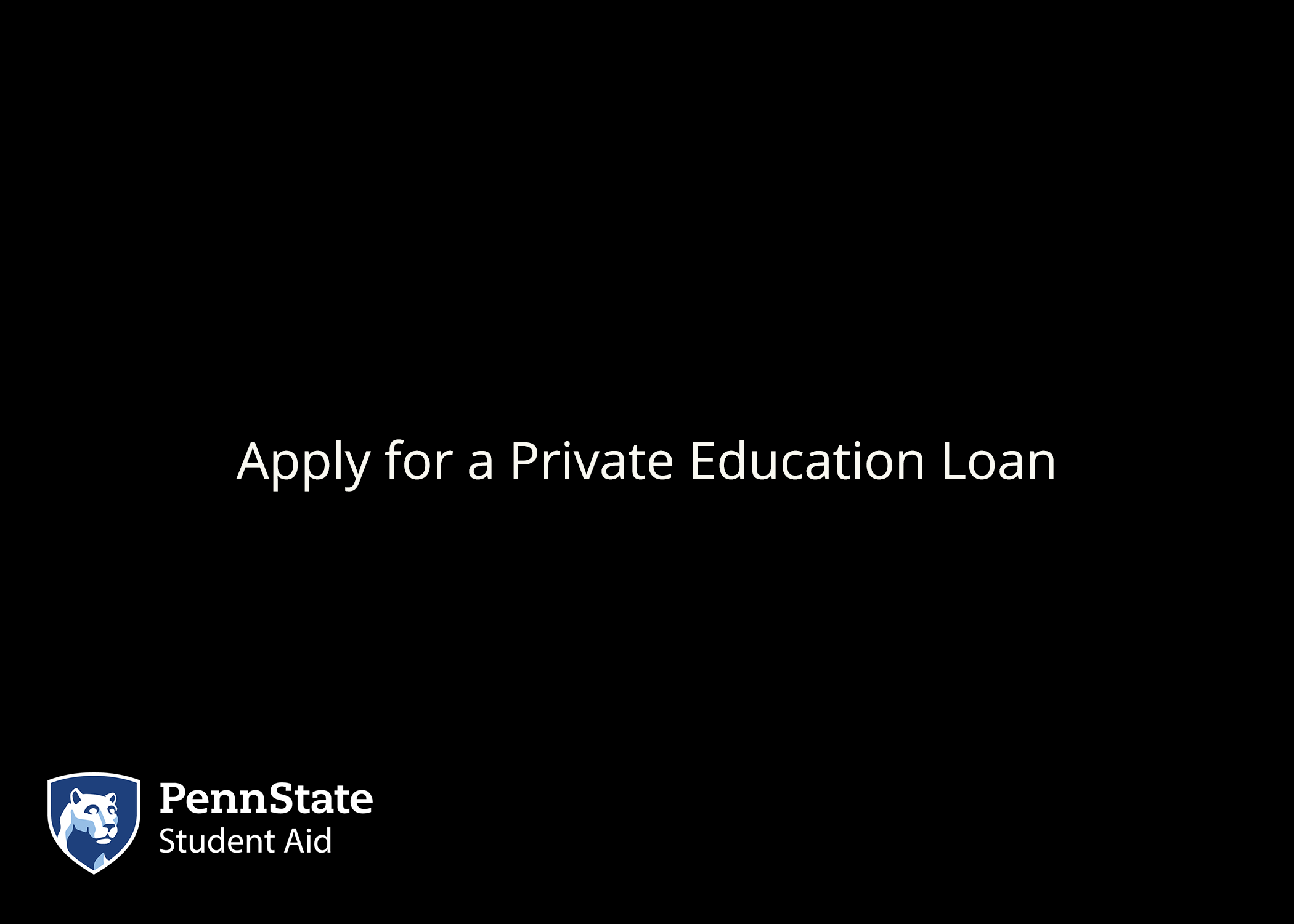Private Education Loans
Federal student loans, such as the Federal Direct Loan and the Parent PLUS Loan, generally have more favorable terms and conditions than private loans. We recommend using all federal loan eligibility before turning to private loans. Compare the loan types here.
Private education loans are managed through private lenders, issued in the student’s name, and require a co-signer. Eligibility, rates, terms, and conditions vary.
Learn how to apply for a Private Education Loan
Applications currently available:
2022-23 (With a lender that will allow you to apply for a previous semester)
- Fall/Spring 2022-23
- Spring-only 2023
- Summer 2023
2023-24
- Fall/Spring 2023-24
- Spring-only 2024
- Summer 2024
View the Tutorial:
Need additional help to figure out how much to borrow? Use our Interactive Loan Worksheet.
Read the Private Loan Tutorial Script:
This video explains how to apply for a Private Education Loans. Private Education Loans are loans provided by private lenders, such as banks and credit unions. Requirements vary according to lender. Most lenders require that the borrower is enrolled in a degree-seeking program and is enrolled at least half-time. You must go directly to the lender of your choosing to apply. Applicants can search for lenders by visiting finaid.org, selecting the “Loans” option, and clicking on Private Education Loans. The Office of Student Aid recommends that you take your time to compare multiple lenders and loan programs.
Most students will need a credit-worthy cosigner to apply for a Private Education Loan. Interest rates will vary from lender to lender depending on the credit-worthiness of the cosigner. Penn State cannot recommend one private lender over another. You will need to contact your lender directly with any questions regarding interest rates.
Once the lender has approved your loan application, an electronic file will be sent to Penn State to be reviewed. As long as an applicant meets the lender's eligibility requirements, the approved loan will be added to your Financial Aid Offer. If additional action is required, such as submitting a FAFSA or correcting a loan term, we will send a communication directly to your Penn State email.
Once the loan has been added to your Financial Aid Offer, you will be able to see the funds listed on LionPATH. Please check to ensure that your loan is for the correct semester and for the desired timeframe. Once you are satisfied with the details of the loan, you will need to accept the funds on LionPATH by selecting the Accept/Decline option. Accepted loans will show as approved anticipated aid on your Bursar bill. The Office of Student Aid will send an electronic notification to your lender that your loan has been approved for use at Penn State. Please note, we cannot send this communication to the lender until you have accepted the loan, so it is important to complete this step in a timely fashion. Private Education Loans include a 10-day right-of-rescission period before funds will disburse. Some lenders require a student to take further action, once the lender receives the certification from the school, to accept the final loan offer before the loan approval and the 10 day mandatory right-of-rescission period would begin, so it is important to stay up to date with information from your lender.
Disbursements can begin 10 days prior to the start of the semester. If your loan is approved after the beginning of the semester, there will still be a 10-day right-of-rescission period prior to the disbursement of funds. Please note, Penn State cannot skip or expedite this 10-day period. After these 10 days, the loan will disburse. The disbursed funds will go towards paying any direct charges on your bill, and any remaining funds will be returned to you in the form of a refund.
Deferment is the period of time between when money is borrowed and when you graduate, including any specified “grace period.” Deferment will vary by lender and product, so check each loan for details. During this time, interest may accrue, but you do not need to make payments. Some loans will allow you to pay the accruing interest during deferment; these are called interest-only payments. It is generally a good idea to pay accruing interest during deferment if you are able. The Office of Student Aid recommends keeping a copy of your loan application for your records.

